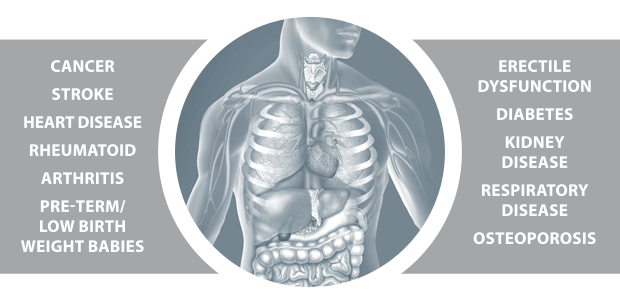
Why See a Periodontist? It’s For Your Health
When you get gum disease treatment, you might think that you’re only improving your oral health and smile. But knowing how to treat gum disease can be critical in preventing systematic health problems. Here are a few diseases that are linked to periodontal disease.
Cancer
According to a growing body of scientific research, cancer risk increases when gum disease is present. In fact, men with a history of gum disease are 14% more likely to develop cancer than men with healthy gums. These patients are 49% more likely to develop kidney cancer, 54% more likely to develop pancreatic cancer and 30% more likely to develop blood cancers. A recent study found that bone loss due to chronic periodontitis also increases the risk of head and neck cancer dramatically.
Stroke
Studies have pointed to a relationship between periodontal disease and stroke. In one study that looked at the causal cerebrovascular ischemia were found more likely to have an oral infection when compared to those in the control group.
Heart Disease
Periodontal disease and cardiovascular disease are both chronic, inflammatory conditions. While a direct cause-and-effect relationship between the two has yet-to-be proven, studies show that patients with periodontal disease have an increased risk of heart disease.
Rheumatoid Arthritis
Researchers studying the connections between rheumatoid arthritis and periodontal disease have found similarities in joint and oral tissues, as well as in the inflammatory processes that affect them. New research suggests that tooth loss – a marker for gum disease – may predict rheumatoid arthritis and its severity. The more teeth lost, the greater the risk of rheumatoid arthritis.
Pre-term / low birth weight babies
Pregnancy may cause unexpected oral health changes due to hormones – particularly an increase in estrogen and progesterone – which can exaggerate the way in which gum tissues react to plaque. Research suggests a link between pre-term delivery, low birthweight babies and periodontal disease. Excessive bacteria can enter the bloodstream through the gums, travel to the uterus and trigger production of prostaglandins that could induce premature labor.
Erectile Dysfunction
A study published in the Journal of Sexual Medicine found that men in their 30s with severe periodontal disease were three times more likely to suffer from erection problems. Another study from the American Urological Association found that prolonged chronic inflammation, like that found in men with periodontal disease, can cause damage to blood vessels which can lead to impotence. While these studies suggest an association between erectile dysfunction and periodontal disease, the American Academy of Periodontology (AAP) believes more research is needed before conclusively linking the two.
Diabetes
People with diabetes are more likely to have periodontal disease than people without diabetes, probably because people with diabetes are more susceptible to contracting infections. In fact, periodontal disease is often considered a complication of diabetes. However, research suggests that the relationship between diabetes and periodontal disease goes both ways – periodontal disease may make it more difficult for people who have diabetes to control their blood sugar.
Kidney Disease
A recent study found that participants who had lost all their teeth were more likely to have kidney disease than patients with healthy teeth. Both periodontal disease and chronic kidney disease are considered inflammatory conditions, and scientific research suggests that inflammation may be the common link between the diseases.
Respiratory Disease
Research has found that bacteria that grow in the oral cavity can be aspirated into the lungs to cause respiratory diseases such as pneumonia. Patients with chronic respiratory diseases had worse periodontal health than the control group, suggesting a relationship between the two diseases.
Osteoporosis
Osteoporosis is a disease in which the density and quality of bone are reduced. When the density of the bone supporting teeth decreases, the teeth no longer have a solid foundation and can fall out.
Knowing how to prevent gum disease and getting gum disease treatment can help reduce your risk and give you better overall health.


